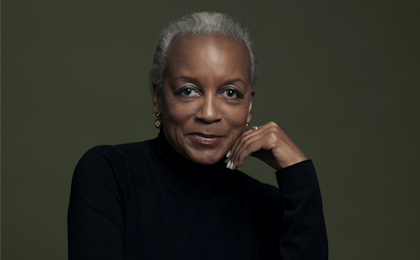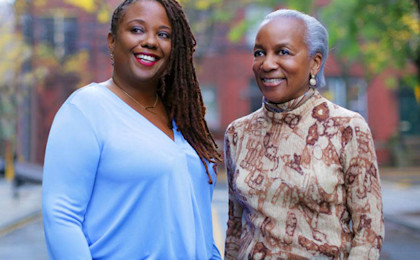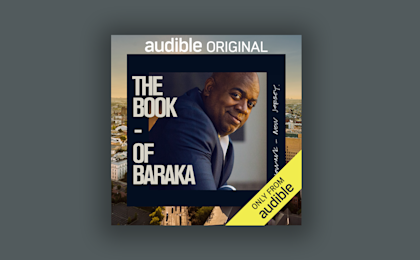Abby West Works to Amplify Stories from Across the Human Spectrum

Abby West is helping to create a new frontier in audio entertainment. After spending several years in print and digital journalism, she joined Audible as an editor in 2017, and in 2018, she co-founded the Black Employee Network (BEN), one of Audible’s employee-led impact groups. She now leads an editorial program dedicated to amplifying a wide spectrum of creative voices, which she loves almost as much as she’s loving her new role as a grandmother to, in her words, “the cutest baby ever.”
What is your role at Audible and what has your career journey been?
As Director of Multicultural Programming, I head up Audible’s Hear My Story program, our always-on approach to amplifying the often-marginalized and underrepresented voices that make up the beautiful spectrum of our world through content creation, acquisition, and promotion. I work with cross-functional teams on insights, direction, and amplification opportunities, particularly with external organizations. Prior to this I was helping to produce our behind-the-scenes content that gives listeners new ways to engage more deeply with the stories they love.
I started off in newspapers with an interest in local politics and health and housing, then went to arts and entertainment magazines for 15 or 20 years. That really taught me that what I cared about most was storytelling, regardless of the medium—reaching people in a fun and relatable way. That ended up being the connective tissue that led to taking the editorial role here at Audible.
How does your approach to editing content differ, coming from a print background to audio?
It’s a different approach because you’re leaving more to the imagination. It can be as technical as not doing a lot of “he said” and “she said” because performers are acting those out and it’s unnecessary. And it can be as intangible as understanding how intimate a format this is, being processed in a different way, inciting imagination in a wholly different way than the written word. They can be paired and go hand in hand, but they are different experiences. Something may benefit from more sound design or a specific cue that moves the story along in a different way from on paper.
What do you like best about your work?
I love talking with smart people about books and storytelling. I really appreciate our original content team, our acquisitions team, and our editorial team. I’m a mission-driven person, so when I’m working hard on my projects, it’s incredibly satisfying to know there are smart, equally driven people right alongside me.
One of the things I appreciated when coming to Audible was the extra attention to the importance of culture, and that it’s something we all create together. There’s a lot of thought and care put into the People Principles, so we have an understanding of what this company stands for and what it encourages employees to do for each other and the communities we live in and serve. Something that makes Audible unique is the marriage of tech, content, and culture.
That’s a great way to put it. Can you give an example of that marriage?
I co-founded, with my fellow editor Yvonne Durant, the Black Employee Network (BEN), mainly to provide key opportunities for Black employees to gain visibility within the company and insights to help with career growth and success, and to foster connections and ally support. But BEN is also impacting the way content is produced; it has been particularly gratifying to see BEN’s very natural and cohesive connections to Audible’s Hear My Story content programming, which ensures people from underserved groups are able to see themselves in the content we’re creating and the creators we’re working with.
You and BEN made a huge impact on Audible employees grieving the murder of George Floyd. Can you talk about that?
I sent out an email to BEN members entitled “It's OKAY if you're NOT okay!” and invited anyone who wanted to join us in a call for the next hour—30-35 people did. Two virtual companywide town halls took place afterward, widely attended by senior leaders including our CEO and the founder and Executive Chairman, because they understood the moment in time; they were the ones to help the company bridge that gap. They took up the reins and kept things moving forward from there. Being remote helped in that moment because we couldn’t have pulled that off in the office.
When you say that being remote helped, how do you mean?
It increased the access both locally and globally; employees from other marketplaces attended those townhalls. But let’s even note that our impromptu first meeting happened at 4:30 p.m. on a Friday. I don’t think we would have been able to say “let’s have a big meeting, right now.” People would normally have had to worry about their commute or have left the office already. That kind of on-the-fly gathering couldn’t have come together like it did, and I’m really grateful we were able to do that at the time it was needed. Not to mention I think being at home gave people, particularly Black employees, a sense of security that allowed them to be vulnerable in the call and express their pain and their anger. Something I don’t think would have happened in person.
Recently you were on The Culture Soup podcast talking about your work paving the way for more storytelling and spoken word from creatives of color. What were some of your favorite takeaways from that conversation?
I loved getting to share our upcoming titles I’m excited about, particularly for Black History Month this year, and sharing my core belief that what really matters is how we can make authentic connections through storytelling.
West’s Current Listen:
There are so many wonderful stories tugging at my heart right now but I would be remiss not to give a shout-out for my BEN co-founder Yvonne Durant’s new memoir, Quite the Contrary. Her story of coming of age in the advertising world as a young Black woman, as well as her unforgettable romance with Miles Davis, takes you on a journey and lets everyone get to know the amazing woman I know. And it’s an indicator of how Audible approaches storytelling, elevating voices that should be heard, well beyond the usual fare.



